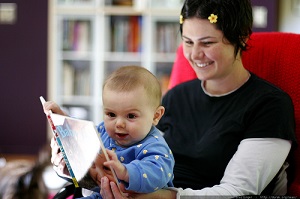
Last week, the American Academy of Pediatrics released an important policy statement,
“Literacy Promotion: An Essential Component of Primary Care Pediatric Practice,” reiterating what reading teachers have known for a long time: Reading regularly with young children builds language, literacy, and social-emotional skills that last a lifetime. Coming from such a prestigious group, reporters across the nation headlined this important statement.
Reading educators, we need to use this statement proactively in sending our message: It is not only oral language that is critically important to children’s development. It is print exposure, time spent reading right from the very beginning that makes an enormous difference in children’s lives.
In short, the statement argues that we can “immunize” children against reading failure by reading early to them. From my perspective, this is a bit of a stretch, and I would not tout this even to a general public. But otherwise, the statement makes some important points. For example:
- It advises parents that reading aloud to children enriches the parent-child relationship and prepares children to learn language and literacy skills.
- It recommends starting earlier than before. Throughout the statement, it highlights starting in infancy.
- It recommends funding for children’s books in pediatric health supervision visits of high-risk children.
- It talks about 5 R’s: reading together; rhyming, (playing, talking, singing, and cuddling together,); routines (and regular times for reading); rewards (for everyday successes); and relationships (that are nurturing, reciprocal, purposeful and enduring).
In our work with families we say to parents, put down your phone and spend time together on reading as a joint activity. As we all know, reading is a wonderful time of intimacy between a parent and child. We tell parents to listen, respond to children’s interests, to engage them in extending what the story is about. If parents themselves have difficulty with reading, we tell them the point of the book is the relationship it establishes early on, the context of being read to, even with words that might differ from those on the page. Young children, especially in infancy, can’t read the words on the page anyway, and won’t know if the parent makes mistakes along the way. They will only recognize that being read to is a moment when they are receiving full attention from a loving adult.
We also try to counsel them on the appropriate selection of good books in the very early years. Bold colors and simple pictures that are clear and distinct, minimal print, cardboard pages to help their little fingers turn a page—a monumental event for the child when he or she takes ownership of the book. Young children love to learn about basic concepts such as the signs in their environment, their house and family members, their fingers, hands and toes. Their attention span is short and sweet, and we make sure to end on the ‘crest of a wave’ rather than deal with a squirmy baby.
In my work with Donna Celano, we came to recognize the importance of reading to your child early on. Last year, we conducted a series of eye-tracking studies with 117 babies. All of our families believed in reading to their children, yet some actually began very early on, as early as 6 months old. By 14 months, we found that children who were read to early on were better able to identify some basic concepts of print; they knew when a book was upside down, and also knew almost one-and-a-half times more words according to the MacArthur Scale of receptive language.
We also know that far too many of our young children are not being read to on a regular basis. In our book, Giving Children a Fighting Chance, we show the tragedy we often see in libraries in poor communities. Children want to be read to, yet no adult to read to them—no adult helps them unlock the mysteries of print that are so intriguing to young children. As a result, we know that children come to school behind and stay behind, having not learned the 'literacy lessons' implicit in storybook reading—how print works, how stories are structured, and how vocabulary and literacy language are learned through books.
Let’s take this moment to spread the word, to galvanize our communities in collaborative efforts to read to very young children. Children, no matter who they are or where they live will all benefit from these efforts.
 Susan B. Neuman is a professor and chair of teaching and learning at New York University, specializing in early literacy development. Previously, she has been a professor at the University of Michigan and has served as the U.S. Assistant Secretary for Elementary and Secondary Education. In her role as assistant secretary, she established the Early Reading First program, the Early Childhood Educator Professional Development Program and was responsible for all activities in Title I of the Elementary and Secondary Act. She has served on the IRA Board of Directors and other numerous boards of nonprofit organizations. She is currently the editor of Reading Research Quarterly.
Susan B. Neuman is a professor and chair of teaching and learning at New York University, specializing in early literacy development. Previously, she has been a professor at the University of Michigan and has served as the U.S. Assistant Secretary for Elementary and Secondary Education. In her role as assistant secretary, she established the Early Reading First program, the Early Childhood Educator Professional Development Program and was responsible for all activities in Title I of the Elementary and Secondary Act. She has served on the IRA Board of Directors and other numerous boards of nonprofit organizations. She is currently the editor of Reading Research Quarterly.